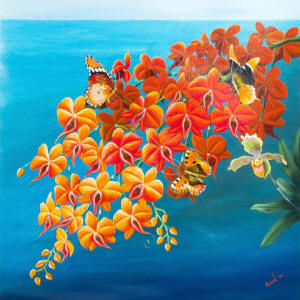Christian Living Stories: Will My Homeland Live Again?
“Haiti will not die, Haiti must not die!” So said Haiti’s President Rene Preval, on the day of national mourning, one month after the earthquake leveled the city that was once my home. I pray he was right.
I was born almost half a century ago in Port-au-Prince, in the poorest and unluckiest country in the Western Hemisphere. Haiti is a rough, mountainous land with few coastal plains, valleys or rivers and lies in the hurricane belt. It suffers from extensive deforestation, erosion and lack of drinkable water.
In the 1700s, some 200 years after the native Arawak Indian population had been decimated by disease and enslavement under the Spaniards, Haiti became a prosperous French colony on the backs of black slaves imported from Africa who worked the sugar cane plantations. In 1804, after a bloody rebellion by the slave population, Haiti became the first independent black nation in the Western Hemisphere. With no outside support and trade embargoes from every slaveholding nation in the world, including the USA, Haiti had little hope for economic success.
French and Creole are the official languages. Catholicism is considered the state religion, but other religious practices are widely spread. About half the population practices voodoo. And then, as if we didn’t have enough problems, my poor, unlucky country suffered a magnitude 7.0 earthquake on January 12, 2010. I am overwhelmed with grief as I hear the news and see the photos and video of thousands of my people injured and killed, and thousands more buried under the rubble without hope of rescue. My emotions are jerked between sadness and relief as I listen to reports of trapped survivors being recovered one moment, then stories of families losing loved ones the next.
My soul is experiencing a deep sense of loss and grief as I see my people trying to recover from this devastation without food, clean water, shelter, and medical help.
You see, most Haitians living abroad and considered as part of the Diaspora, still consider Haiti to be our home, even if we are citizens of another country. Some countries allow their citizens to keep a dual citizenship, but Haiti doesn’t. So most of us adopted the citizenship of the country to which we emigrated, and where we now are getting our livelihood and raising our families. We are very grateful for this opportunity to have a better life abroad. It allows us to be able to support family and friends in Haiti who count on us for their daily existence. We are all still Haitians in our hearts.
I thank God that so many nations are helping us. A multitude of helpers, equipment and supplies has descended on Port-au-Prince. I stand in awe at the rallying spirit of the nations standing together to help my people. But my soul is still exceedingly grieved as I don’t know how we are going to make it in the long term.
We are going to need help for many, many years — perhaps decades. Jobs must be created, schools must start over, infrastructure and homes must be rebuilt in order for hope to grow again in the heart of the people. Courageous, honest leaders must rise up from the destruction and ashes. But are the nations of the world and the Haitian people ready for such a heavy undertaking? Will Haiti find the support it needs as the months and years go by?
If Haiti was the poorest nation in the Hemisphere before the earthquake, what about now?
Who knows what the future will bring? I certainly don’t. What I do see is that right now my people are experiencing Jesus in the flesh. The Haitian people are feeling, touching, smelling, and seeing Jesus through the help and sacrifice of the humanitarian workers.
The heart, mouth, feet and hands of Jesus are evident in the smiles, tears, hard work and love of the volunteers. As he was touching his children in Haiti, he also allowed me to experience him deeply through the phone calls, notes, emails, and hugs of others who shared with me their sympathy, love and prayers. Jesus was embracing me through the caring and love of the most unexpected people.
When we are going through something we don’t understand, we have to trust Jesus. In trusting him, we can keep hope alive. We can remember that the Father, the Son and the Holy Spirit are with us always.
Only God can turn something as desperate as this monumental tragedy in Haiti into something good. Only God can turn hearts to love. Only God can rebuild lives. That’s our Father’s way! It is his love in us that blesses the hurting and the helpless. May that work continue until the job is done.
 Marie lives in California with her husband Morange and three children. She enjoys reading, traveling and writing as a hobby in her spare time. Connect at MarieMonaus@HealingShepherdOnline.org
Marie lives in California with her husband Morange and three children. She enjoys reading, traveling and writing as a hobby in her spare time. Connect at MarieMonaus@HealingShepherdOnline.org
Haiti and America
Everyone knows that the United States was the first nation in the Western Hemisphere to throw off colonial rule and declare independence. But how many realize that Haiti was the second?
In the years following the Revolutionary War and the Declaration of Independence, large parts of what is now the USA were still very much “up for grabs.” The French had dreams of a North American Empire, and had claimed a huge slice of territory reaching from New Orleans to the Canadian border. Much of this was still a wilderness. France’s most important New World colonies were the Caribbean islands. And the richest and most prosperous of all was the one they called the “Pearl of the Antilles”—the land that is now Haiti.
Haiti’s wealth was founded on slave labor, and the slavery in Haiti was particularly brutal. In the late 1700s, when France was convulsed in its own revolution, the Haitians also rebelled and demanded freedom. There was not much the French could do about it, and for a few years, the slaves enjoyed a measure of freedom. But in the early 1800s, the Emperor Napoleon, now firmly in charge of the new French Republic, decided that he needed to safeguard his North American territories against the Americans, the British and other rival powers. He sent a large force to strengthen his stronghold in New Orleans. On the way, they were ordered to stop over in Haiti to restore Imperial rule and re-impose slavery.
This was supposed to be a quick mopping-up operation. But Napoleon underestimated the determination of the Haitians, who had no intention of becoming slaves again. They fought back, and the “mopping-up operation” became a long and brutal war. The French army was decimated, and had to retreat. In 1804, Haiti declared itself an independent nation.
With his army decimated, Napoleon was left without sufficient forces to defend his North American possessions. Faced with wars in Europe, France abandoned the dream of a North American Empire, and in 1803 France sold Louisiana and its territories to the United States, for about 3 cents an acre.
The determination of the Haitians to remain free became a factor in the greatest real-estate deal in history, and the future power and prosperity of the United States.
About our cover
 Although it has been several months since a devastating 7.0 earthquake leveled Port-au-Prince, we felt we needed to say something about Haiti. But how to illustrate it?
Although it has been several months since a devastating 7.0 earthquake leveled Port-au-Prince, we felt we needed to say something about Haiti. But how to illustrate it?
We could have chosen the usual route—pancaked buildings and gaunt-eyed refugees. But there is another side to the Haitian story. We asked Andre Naval, a Haitian professional artist, to paint us a cover symbolizing how he felt about the future.
Andre’s work is filled with vibrant color and energy, reflecting life as it could and should be rather than the drab poverty of life in Haiti as it actually is today. Andre may be surrounded with squalor, but his art is filled with life and brilliance. He especially loves painting butterflies and flowers, the quintessential symbols of transformation and new life, a whisper of hope for the future.
Author: Marie Antoinette Monaus
